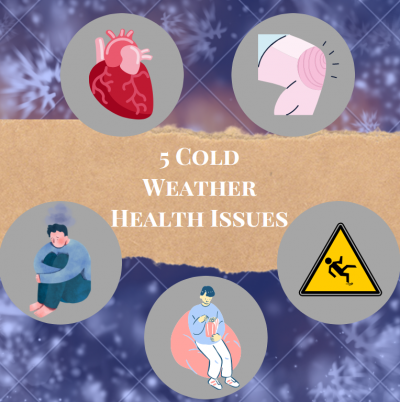5 Cold Weather Health Issues to Watch Out During Cold Season
updated,8 December 2023
The health impacts of cold weather, how the human body reacts to low temperatures, and the effects of winter on your health may be affected for the better or the worse depending on your response to the different aspects of cold winter.
We’ll take a look at the top 5 ways cold weather can affect your body.

1. Does Joint Pain Increase In Cold Weather?
Your grandfather swears that he feels pain in his joints once it’s about to snow or when there’s a cold storm approaching and the temperature gets low. Is he right?
While evidence of the weather affecting joints is mostly subjective, some explanation for this tells about the barometric pressure which can cause tissues to swell, putting pressure on joints.
So! What should be done? Any time you have chronic joint pain, you should speak with one of our primary care physicians. Your healthcare provider can prescribe you some remedies or medications ( NSAIDs or Analgesics) to ease your pain.
2. Injuries And Accidents Show A Rise!
A slip on the ice isn’t good for anyone, particularly those with osteoporosis, a disease that causes brittle bones. In that case, one minor fall can cause serious problems such as a hip or knee fracture. Are you unsure about the health or strength of your bones? We suggest having a bone density scan if you have risks for weak bones (like Age, post-menopause, thyroid disease, obesity…etc).
This non-invasive test evaluates the strength of your bones. It takes less than 15 minutes and is vital to help your primary care physician treat osteoporosis or low bone mass early before problems occur.
Of course, the best-case scenario is to avoid falls before they happen.
Be sure to use shoes that have good, textured soles. Make sure you use the arm rail, even if you think it’s not needed.
3. Can Cold Weather Give You A Heart Attack?
During cold weather, blood vessels can narrow in a process called vasoconstriction.
Narrow blood vessels can increase your risk of a heart attack, according to information from Harvard Medical School. When temperatures drop, the risk of heart attack or heart problems increases.
The key to keeping your heart as safe as possible is to always dress appropriately for the weather. This means using a warm hat, gloves, and a coat.
You should also be careful when exercising outdoors in colder weather.
4. The Change In Seasons Does Impact Your Mental Health.
.Everyone’s body has a natural sleep/wake cycle that serves as an internal clock. This is called the circadian rhythm, and it also controls mood.
The early darkness in the winter, combined with the fact that the sky gets bright later in the morning, affects your sleep cycle, your brain chemistry, and as a result, your mood, according to information from Cleveland Clinic.
While almost everyone can relate to the “winter blues,” many have a more serious form of depression called seasonal affective disorder.
According to the American Psychological Association, exposure to sunlight, or specific types of indoor lamps, can help.
5. Is a Sedentary Lifestyle In Winter A Real Problem?
Something about the cold, dark days makes you want to cozy up with a nice book and a warm blanket. While this is acceptable on occasion, the change in weather should not be used to justify a sedentary lifestyle.
Sedentary behavior can have negative consequences for your health, including weight gain, which can put you at risk for Type 2 diabetes, high cholesterol, and other diseases.
Maintaining an exercise program is crucial, but it's usually best if you stick to indoor activities because exercising outdoors can cause health problems of its own. (See the third point above.)
Back